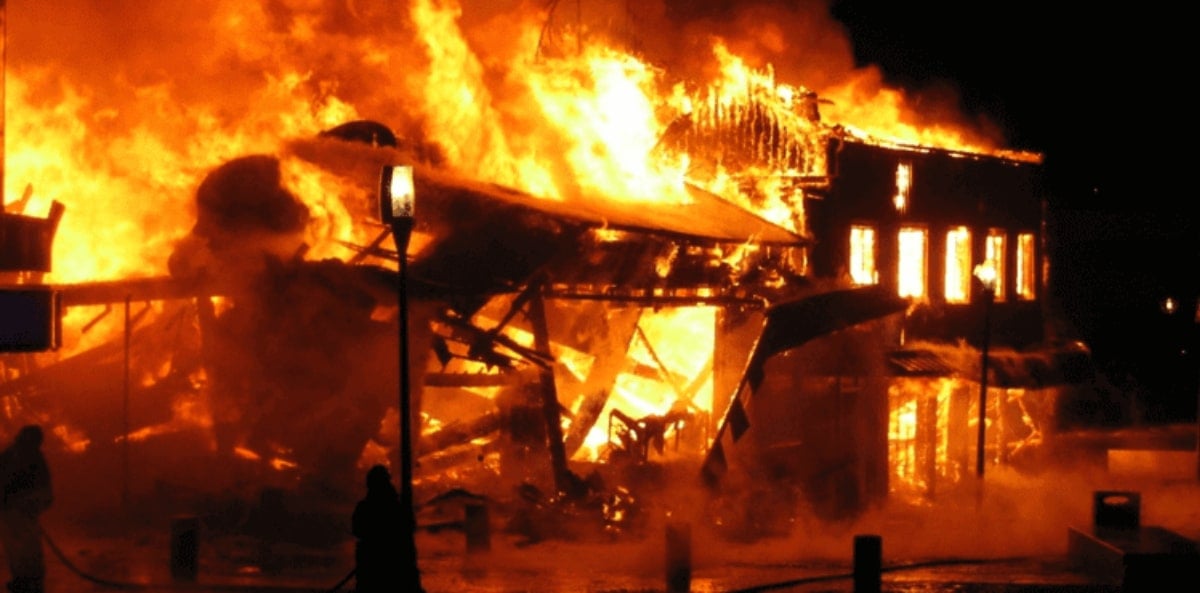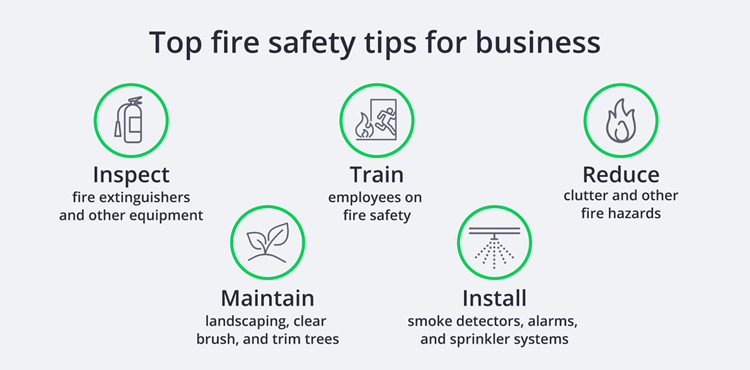Fire insurance for small businesses: Protect yourself and your bottom line

In 2022, there were an estimated 129,500 nonresidential building fires, resulting in 140 deaths and $3.7 billion in financial losses, according to the U.S. Fire Administration.
Taking steps to reduce your risks and having the right insurance in place can help you minimize the chances of a fire and help you recover if a fire happens.
How commercial insurance can help you recover from a fire
A fire doesn’t just destroy your property. It can leave you liable for damage to property that belongs to customers or other third parties, and force your business to close for an extended period of time.
That’s why you should consider the following types of coverage to guard against the risk of fires. Together, these insurance policies can help you replace or repair your damaged property and keep your business up and running.
Commercial property insurance
Also known as business hazard insurance, commercial property insurance covers physical assets such as business-owned equipment, furnishings, and inventories.
This type of business insurance typically includes commercial fire insurance, which covers fire and smoke damage to your business property. It can also pay for damage caused by firefighters.
This policy can be affordable for small business owners, as you can manage your insurance costs by choosing one of two coverage options on how you’ll be reimbursed for a loss. You have the option of receiving either the replacement value for all brand-new items, or their actual cash value.
For example, if a restaurant has a kitchen fire, the owner might want their property coverage to pay for all brand-new equipment. Opting for the replacement cost would require a higher premium, but would also increase the amount you receive on your claim after a fire.
In contrast to this, insuring for the actual cash value of your property would help save you money on premiums, but would also reduce the amount you receive on a claim. Your insurance company would reduce its payment by the valued amount of depreciation for your equipment from the time of purchase.
Of course, you can also adjust your premium through the amount of your insurance deductible. However, don't set it so high that it might be difficult to pay, as your insurance won't activate until the deductible is paid.

General liability insurance
A general liability insurance policy covers common business risks, such as third-party injuries and property damage, along with lawsuits over defamation.
In the case of a commercial fire claim, this liability coverage would help pay for customer property that was damaged or destroyed. A general liability policy could also pay for medical treatment if a customer, vendor, or other third party was injured due to a fire at your business. It also covers damage to rented premises in the event of an accidental fire.
Business owner's policy
A business owner’s policy (BOP) is a smart bet for many small businesses. This coverage combines general liability insurance with a commercial property insurance policy, typically at a lower rate than if you purchased each of these policies separately.
For example, if a fire happened at a factory, it could suffer a loss of equipment, inventory, and supplies. A BOP would help pay for the loss of destroyed items and repairs for any damaged items.
The business property insurance portion of a BOP typically does not include coverage for crops, wharves, docks, or outside trees and plants. You can get additional coverage in the form of an endorsement, such as finished stock insurance for agricultural-based products.
Not every small business owner will qualify for a BOP, so speak to an insurance agent to find out if you’re eligible.
Business interruption insurance
Business interruption insurance, also known as business income insurance, is typically available as a rider to a commercial property policy or BOP. This coverage kicks in when your business must close temporarily because of an unexpected event, such as a fire or natural disaster.
Business interruption can cover a variety of business and operating expenses, including:
- Rent payments
- Employee salaries
- Relocation costs
- Loss of business income
- Debt payments
- Cleaning and repairs
For example, let’s say you have an electrical fire in the server room of your IT consulting company, and it ends up destroying your office. Your business is forced to close, so you find a temporary office space and new equipment.
A business interruption insurance rider on your BOP would cover your rent payments, relocation costs, and lost income.

Commercial auto insurance
If your company owns a vehicle, you’re probably required by law to carry a commercial auto insurance policy. In the event of an accident, it helps cover the costs of related injuries and property damage. It can also protect your vehicle from costs associated with fire damage, too.
Auto liability coverage, which is required in most states, covers any damage and injuries your vehicle may cause to other people and their property.
Comprehensive coverage insures against damage to the vehicle itself. This typically includes vandalism, theft, fire, and water damage.
For example, if there’s a fire at your trucking business that damages your delivery vehicles, comprehensive commercial auto insurance would help cover the cost of replacing or repairing them.
This insurance coverage is especially important in areas where the risks of wildfires and other disasters are high. You should talk to an agent to make sure there are no restrictions or exclusions in your policy based upon your location.

How to reduce the risk of fire at your business
In addition to carrying the fire policies mentioned above, it’s important to reduce the risk of a fire happening in the first place—and to keep it from spreading or hurting anyone in the event that it should happen.
Here are some loss control and preventive measures you can take to reduce risks and increase safety:
- Inspect your fire extinguishers on a regular basis. Make sure they’re in compliance with local fire codes, and consider buying other equipment and supplies, such as fire blankets.
- Install sprinklers or other fire suppression systems.
- Make sure all employees know how to use equipment. It's also important to clearly map out where the equipment is located.
- Clean and inspect all equipment on a regular basis. Especially with cooking and manufacturing gear, consider hiring a third-party cleaning contractor to make sure this is done properly.
- Reduce clutter and make sure all flammable materials are properly stored.
- Have at least two fire exits that are properly labeled. Ensure they are easily accessible and known to all employees. Hold fire drills at least once a year.
- Maintain the landscaping around your building. Clear any brush and trim trees near your building, especially in wildfire-prone areas.
- Safely store risky appliances. Space heaters and other potential fire hazards should be kept unplugged or out of the building when not needed. It's also important to place electrical appliances, such as toasters and coffeemakers, away from paper and other flammable materials.
When are sprinkler systems required in commercial buildings?
Under standards set by the National Fire Protection Association (NFPA), all new commercial buildings with a fire area of 5,000 square feet or more must have fire sprinklers that meet the NFPA 13 standard.
Restaurants must have a UL 300-compliant wet chemical fire suppression system and follow the NFPA 96 standard for ventilation and fire protection.
Any remodeling that increases the size of an existing building to 12,000 square feet or more must add a fire suppression system. Sprinkler systems are also required for buildings more than 55 feet tall.
Residential buildings that house multiple people must also have sprinklers. These include dormitories and nursing homes.
Of course, your own state or local government might also have its own sprinkler and fire codes. Your county or municipal zoning office can help you determine what’s needed.
Some changes to your business, such as buying new equipment, can impact the amount of fire insurance you need and your risk management strategy. New staff may need additional fire protection equipment and safety training. Stay on top of these changes to ensure the best protection possible.

Find small business insurance quotes from top U.S. carriers with Insureon
Complete Insureon’s easy online application today to get quotes from top-rated U.S. insurance providers for commercial property coverage and other types of fire insurance. You can also consult with an insurance agent on your business insurance needs.
Once you find the right policies for your small business, you can begin coverage and get your certificate of insurance (COI) in less than 24 hours.
Mike Mosser, Content Specialist
Mike spent several years as a reporter and editor covering politics, crime, and the world financial markets. He’s worked for several newspapers, a financial newswire, and a monthly magazine. As a copywriter, Mike has produced SEO-based content, marketing, public relations, and advertising work for a variety of companies.










